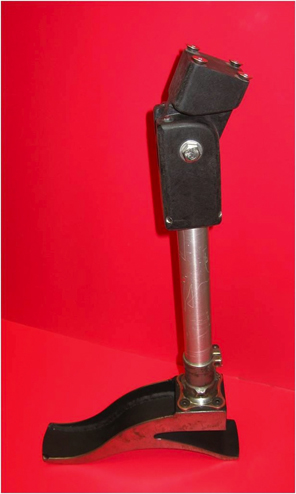
FAYETTEVILLE, Ark. – Doctors and aid workers fear the Haitian earthquake has created a generation of amputees. Many of these survivors are children, as roughly half of the country’s 9.8 million people are younger than 21.
To help address this emerging crisis, students in the biological and agricultural engineering department at the University of Arkansas have helped organize the Northwest Arkansas Limb Drive for Haiti. The event will be held from 10 a.m. to 4 p.m. Saturday, March 6, at the Pauline Whitaker Arena on Garland Avenue.
The students and their teacher, Physicians for Peace, an international medical mission based in Virginia, and Hanger Orthopedic Group to collect used prostheses – otherwise known as artificial limbs. Similar events, some of which also collect crutches, canes, walkers and wheelchairs, are being held in communities across the United States.
Costello and his biological-engineering students have worked with Physicians for Peace since 2006. Several teams of students in his senior design course have designed low-cost prosthetics that can be manufactured in developing countries. Students have twice visited a prosthetic clinic in the Dominican Republic, which shares the island of Hispaniola with Haiti, to get feedback on their designs.
In 2008, students developed a simple, low-cost prosthetic knee. A current team is developing an innovative artificial foot. Such devices have even greater value and motivate students even more, Costello said, now that a new, large group of Haitians will need replacement prostheses for decades to come.
Several recent news reports from Haiti have mentioned that small hospitals and makeshift medical clinics have had to perform numerous amputations every day following the earthquake. Some survivors suffered devastating injuries when buildings collapsed. Others lost limbs in the process of being freed from wreckage. Still other survivors are now losing limbs due to serious infections, wounds that will not heal or gangrene. Often, doctors must amputate a limb to save a patient’s life.
“It is difficult to measure the full extent of this tragedy, but some aid workers have estimated that between 2,000 and 4,000 people have lost an arm or leg in the aftermath of the earthquake,” Costello said. “Those who have lost a leg will be completely immobile until they receive crutches or a wheel chair. Eventually, patients who are fitted with an artificial limb will be taught to walk and maybe even run again.”
With a per capita income between $380 and $550 per year, depending on the source, Haiti is the poorest country in the Western Hemisphere. It does not have the resources to meet the needs of the overwhelming number of amputees created by the earthquake. Disabled Haitians cannot afford to buy high-tech prostheses.
A new prosthesis in the United States costs between $5,000 and $10,000. Amputees are often fitted with a new prosthesis every one to three years. Many components of the used limbs are still functional but cannot be legally re-used in this country. Discarded prostheses can be donated for use in developing countries. Medical teams have been using components salvaged from used limbs to fit patients in Haiti. Use of simple, locally made devices, such as those designed by the Arkansas students, is another way for these medical needs to be met, Costello said.
In addition to taking prostheses to the Pauline Whitaker Arena on March 6, donors can take used limbs to any Hanger office, and Hanger will ship them to Physicians for Peace in Haiti. Local communities are encouraged to promote limb collection efforts.
Northwest Arkansas residents who are unable to drop off limb donations at the arena on March 6 may call to arrange a pickup by a student volunteer. For more information, visit LimbDrive.org or call the department of biological and agricultural engineering at 479-575-2351. Only donations of orthopedic rehabilitation equipment and devices will be accepted. The event organizers ask donors not to bring clothing, food or other relief supplies.
Contacts
Tom Costello, associate professor, biological and agricultural e
Division of Agriculture and College of Engineering
479-575-2351,
Matt McGowan, science and research communications officer
University Relations
479-575-4246,